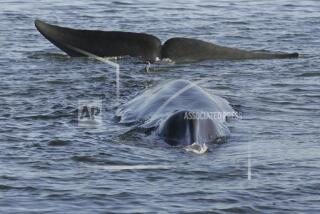Tourists With Cameras Replace Hunters on the Ice : Lately, Canada’s White Seal Pups Are Born to Be Petted, Not Clubbed
- Share via
NEW YORK — With the certainty of the ages, an annual miracle of nature will take place next month on the ice of Canada’s Gulf of St. Lawrence. With almost equal certainty, Brian Davies will be there.
Davies has not missed the spectacle in 22 years, but this is the year he has been waiting for.
“It’s the end of a quest,” he was saying the other day from his home in Florida. His itch to be on his way was apparent even over the phone. “It’s the impossible dream come true.”
Davies’ dream is that this year, more than a mere handful of people--perhaps hundreds--will witness that spectacle, and that their numbers and enthusiasm will ensure that never again will a seal pup be clubbed to death for its hide. And, yes, it looks like the dream might come true.
The annual spectacle is the arrival of more than 600,000 young harp seals during the first weeks of March on the ice pack off the Magdalen Islands.
For centuries the seals pups, which are born white, were taken at the rate of 180,000 a year for their pelts. But no longer. Davies’ joy arises from a terse notice posted recently by Canada’s Ministry of Fisheries and Oceans. It reads:
“All commercial hunting of white coat harp seals . . . will be ended.”
400-Year-Old Tradition
The notice did away with a tradition perhaps 400 years old in the far north.
Even so, it caused little stir outside of Canada because it seemed merely to assert the obvious. It was a formal communique setting out terms of surrender. Hasn’t the spring seal hunt been dead, in effect, for five years?
Yes, and Brian Davies was in the front line of the hundreds of animal-rights advocates who worked to end it. When their outcries of disgust persuaded the European Economic Community to join the United States in banning the importation of white seal pelts, the market for the fur collapsed and so, in turn, did the commercial hunting.
So the new Canadian policy is sort of an official death certificate, and in Davies’ view, it makes all the difference.
“Government policy is a far cry from marketplace moods,” he said. “The Common Market ban expires next year. What if it is not renewed?” So now, at last, Davies may push ahead unhindered with what has become his new crusade, his new dream.
New Tours Promoted
Davies and the organization he founded, the International Fund for Animal Welfare, have put up $1 million to establish a tourist business to replace the income lost to the change, at least in the Magdalen Islands. “We believe the islanders can earn more from live seals than from dead ones,” he said.
Last March, the fledgling tour business got off the ground, but hesitantly, because hunting, even if unprofitable, was still allowed. While Davies and his aides kept a wary eye out, helicopters ferried about 300 parka-clad, camera-strung tourists in small groups to the ice field nursery of the harp seals. It is as bleak and forbidding a place as the planet offers, and as enchanting.
They walked where no human feet had been before. They petted the newborn balls of white fluff. They watched mama seals pop up from blowholes in the ice to cast quizzical looks upon these two-legged creatures never before seen. At dusk, the tourists took their leave to a chorus primeval, a Te Deum exalted across 15 miles of sea ice unto eternity--the sound of 600,000 wee voices bawling for milk. By dawn the wind and snow had erased every trace of the visitor.
Hostility on Islands
The tours last March did not leave from the Magdalen Islands. Hostility toward the Davies organization and others who had deprived the islanders of part of their livelihood was too intense to risk using the Magdalens as a tourist base. Last year, the tours departed from Prince Edward Island, 90 miles to the south.
Owing at least in part to the new government policy--and perhaps to good feelings resulting from a bumper catch of lobster last summer--the islanders’ attitudes seem to have changed. This year, the tours will depart from the Magdalens as well.
“I don’t think there will be any trouble at all,” said Christopher Clark, a fisherman and former seal hunter from Grosse Ile, one of the nine islands in the Magdalen chain. “We are not violent people.”
In fact, Clark said, he would be glad to go to work as a tour guide, “but I don’t think I would get the chance. We certainly have nothing against tourism.”
Certainly not. The Magdalens-- Iles de la Madeleine in the language spoken there--were settled by Acadians when the British drove them out of Nova Scotia in 1755. The islands have acres of serene white beaches that sparkle like pearls in the clear blue waters of the gulf. The Madelinots, who number about 14,000, pursue summer tourists as assiduously as they do lobster.
Local Hunters Banned
In the sealing days, large, company-owned ships with big crews took about 140,000 pelts a year. The Madelinots took fewer than 30,000, and most of the islanders worked as individuals. Lone hunters reached the seals by dragging wooden dories through floes onto the solid ice, an arduous and perilous task.
So the Madelinots’ loss has been personal rather than institutional, and Davies feels an obligation toward them. “Preaching animal welfare has a hollow ring if you’re not also concerned about human welfare,” he said.
At a time when pelts brought $35 apiece, the seal hunt meant about $1 million a year, on the average, to the islands’ economy.
“I have no doubt a March tourist business can generate that much income in the Magdalens, maybe even more,” said Jean-Yves Roy, a Department of Fisheries agent assigned to the islands.
One islander who agrees is Andre Bourque, who operates the family-owned Chateau Madelinot, a two-story motel on the island of Cap-Aux-Meules. Bourque has no trouble filling his 100 rooms during the summer season. In the old days of seal hunting, he had a house full as well with transient sealers, fisheries officials and others. In each of the last two years, though, only about 20 stragglers have needed rooms during March.
Hotel Business Booming
This year, a bonanza. He already has 100 reservations and expects to make at least another 100. Many found him through Davies’ headquarters at Barnstable, Mass., but Bourque also has scheduled groups through tour agents in Montreal and Boston, and a group of 50 people from Paris.
As for the islanders’ attitudes, in Bourque’s view, resentment is a thing of the past.
“I’m one of the ones who lost the most,” he said. “I never had anything against the hunt, but I well respect the opinions of the people who did. They fought to end it in part because of the animals’ beauty. For the same reason, they will be back. They are people who love animals, and they will be well received.”
Is the seal pup hunt ended forever? What would happen, Brian Davies wonders, if the European Common Market did not renew its ban on the pelts? With the market reopened, would Canada then lift its ban on hunting?
“That’s a good question,” said Pierre Comeau of the Fisheries and Oceans Ministry from his office in Ottawa. “Forever is a long time, but the answer is no. The white coat hunt is over. It is simply not acceptable to the public, and I do not foresee how it would ever be allowed again.”
In fact, Comeau pointed out, the $4 million Canada had set aside to develop markets for the white furs in the Far East, to counteract the European ban, now will be spent to develop new industries to take the place of the seal hunt.
Such as tourism?
“Well, yes, perhaps. I wouldn’t count anything out.”
More to Read
Sign up for Essential California
The most important California stories and recommendations in your inbox every morning.
You may occasionally receive promotional content from the Los Angeles Times.










